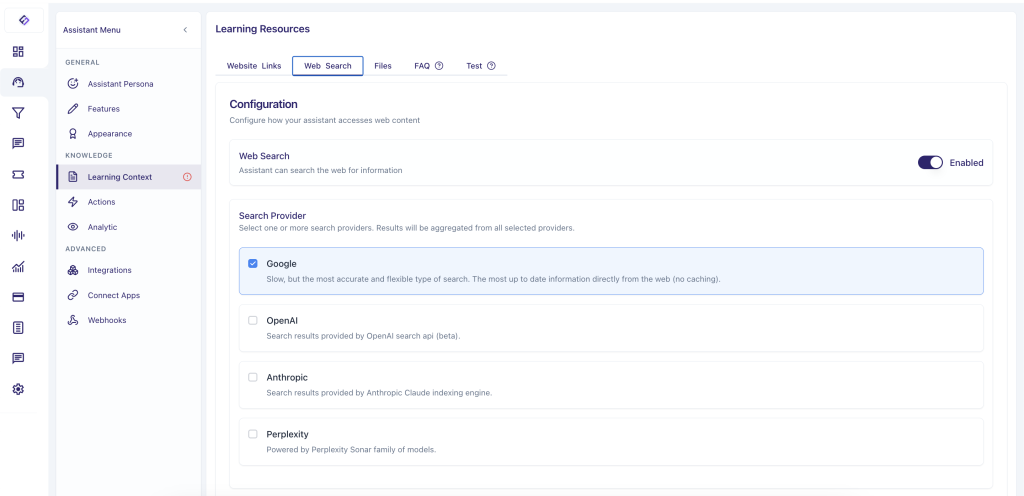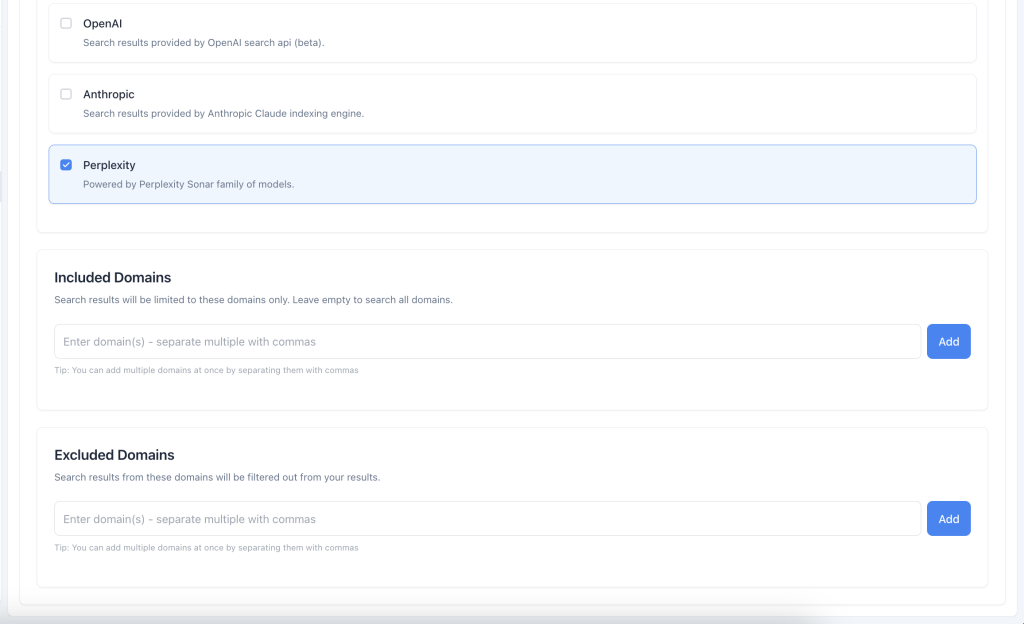Fineguide.ai Websearch Feature Explained: 4 Search Engines, Domain Filters, and Smarter AI Agents
Have You Ever Wondered How Smart an AI Could Be with the Right Search Tools?
Imagine you’re working on a project, and you ask an AI for the latest research. It gives you something helpful, but you can’t quite tell if it’s fully up to date or sourced from the right places. That’s a common challenge with AI assistants: their knowledge is powerful, but often limited to what they were trained on.
Now, what if your AI could search the web in real time with multiple engines, each with unique strengths? That’s exactly what fineguide.ai’s new websearch feature makes possible.
Let’s break down what this tool does, how it works, and why it’s a game-changer for businesses.
What Is the Fineguide.ai Websearch Feature?
The new feature allows AI agents on fineguide.ai to search the internet directly instead of relying only on their built-in knowledge. Think of it as giving your AI access to a live library of the web, so it can bring you back the most relevant, accurate, and up-to-date insights.
And it’s not just one search engine. You get access to four different options:
- Perplexity – lightning-fast, always fresh
- Google – slower, but highly accurate
- OpenAI – balanced in speed and reliability
- Claude – similar to OpenAI, with its own approach to retrieval
Each engine has its own strengths, and you can choose the one that fits your situation best.

How Each Search Engine Works Within Fineguide.ai
1. Perplexity: Fast and Fresh
If speed matters most – for example, monitoring breaking news or industry updates – Perplexity is often the best choice.
2. Google: Slow but Precise
When accuracy and authority are critical, Google usually delivers the strongest results. It’s ideal for compliance-heavy industries or when reliability is non-negotiable.
3. OpenAI: Balanced and Reliable
OpenAI’s search provides a good balance of speed and thoroughness. It’s well-suited for general queries where you need confidence without long wait times.
4. Claude: Another Balanced Option
Claude’s engine is similar to OpenAI’s, making it another solid option for everyday use and cross-checking results.
Can You Use All Search Engines Together?
Yes, you can run multiple search engines consecutively. But here’s the tradeoff: the more engines you use, the longer it takes to return results.
In most cases, one engine is enough. If you need a second opinion, try pairing two. Using all four is possible, but it’s rarely necessary and can slow down response times.
Smarter Searching with Domain Filters
One of the most valuable aspects of the websearch feature is domain filtering.
You can whitelist or blacklist certain domains, giving you control over which sources the AI uses. This means you can shape searches to match your business needs:
- Whitelist: Focus only on trusted websites like official industry portals, academic databases, or government sites.
- Blacklist: Exclude low-quality blogs, spam-heavy sites, or domains you don’t trust.
This is particularly powerful for companies that need to ensure information accuracy. For example, a healthcare provider might whitelist medical journals, while a finance firm might restrict searches to regulatory bodies and leading financial publications.

Practical Use Cases: When This Feature Really Shines
Fineguide.ai’s websearch is designed to help businesses and their agents deliver accurate, timely, and reliable support. Here are some scenarios where it proves especially valuable:
- Customer Support Teams: A SaaS company with frequent product updates can configure its AI agent to always check the latest documentation, ensuring customers never receive outdated instructions.
- HR & Internal Helpdesks: Employees often ask about benefits, workplace policies, or compliance. With domain filters, an internal agent can pull information only from official company portals or HR-approved sources.
- Legal & Compliance Departments: Regulations and standards evolve quickly. Companies can set their AI agents to source directly from government websites or recognized legal resources, minimizing the risk of outdated advice.
- Financial Services & Advisory Firms: Markets shift daily. An AI agent can surface the latest insights from trusted financial outlets while filtering out unreliable commentary.
- Healthcare & Medical Providers: Clinics and telehealth companies can whitelist journals and trusted health agencies, giving patients clear, evidence-based guidance.
The real win here is control – companies decide exactly where their AI looks for answers, which helps balance speed, trust, and accuracy.
Why This Matters for Businesses
It’s easy to feel overwhelmed when information is scattered across countless sources. By combining websearch with domain filters, fineguide.ai puts businesses back in control. Agents don’t just answer faster – they answer with the right information, tailored to your company’s standards.
FAQs About the Fineguide.ai Websearch Feature
1. Can I use more than one search engine at the same time?
Yes, but it may slow results. Most of the time, one engine is enough.
2. Which search engine is best for industry news?
Perplexity is usually the fastest and most current.
3. What if I only want official or trusted sources?
Use the whitelist option to restrict results to specific domains.
4. Can I block unreliable websites?
Yes. The blacklist option lets you exclude unwanted sources.
5. Does the AI pick the engine for me?
No, you choose which engine to use. This ensures control stays in your hands.
6. Is this feature useful for internal company agents?
Absolutely. Internal helpdesks, HR bots, and compliance agents benefit the most by always pulling up-to-date, source-controlled information.
Conclusion: A Smarter Way to Search with AI
The new fineguide.ai websearch feature gives companies more than answers – it gives them confidence. By choosing the right search engine and filtering sources, businesses can ensure their AI agents stay accurate, current, and trustworthy.
So the next time you rely on an AI agent, ask yourself: Which search engine and sources should it draw from? That small decision could make a big difference in the quality of the support you deliver.